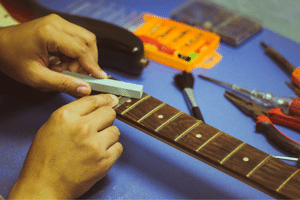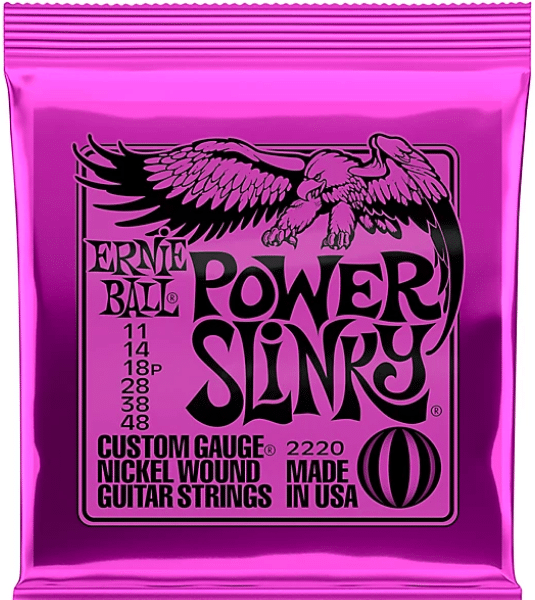Hey there, fellow guitar enthusiasts! Ever found yourself tuning your guitar more often than you’d like and wondered, “Do Heavier Gauge Strings Stay In Tune Better?” Well, you’re not alone. It’s a question that’s been plucked, strummed, and bent by guitarists of all levels.
Whether you’re a weekend warrior jamming in your garage or a seasoned pro rocking the stage, tuning stability is something we all care about. And let’s face it, constantly retuning in the middle of a killer solo can be more annoying than a broken pick! So, grab your axe, and let’s unravel this string theory together!
So, let’s dive into this head-scratching topic and the science behind it all to find out what really keeps those strings in tune.
You can use the table of contents below to take you to the area that interests you. Click on the little box to open it, and then click on the section of the article you want to read, or you can read from start to finish if you want the full guitar string experience!
The Short Answer
While heavier gauge strings are generally more stable and less prone to tuning problems, your guitar’s overall setup, including the truss rod, pickups, and bridge, all play a significant role in maintaining pitch. A heavier string set will offer better tension and tone if you’re into drop tunings. The ideal string gauge is a balance of multiple factors, from tone, playability, and your playing style to musical genre.
Keep On Reading (Below) To Learn More
The Great Gauge Debate
What Are String Gauges?
String gauges refer to the thickness or diameter of the strings on your guitar. They play a crucial role in determining the feel, sound, and playability of the instrument. Each gauge has unique characteristics, from the delicate touch of extra light strings to the robust presence of heavy ones.
Heavier Vs. Lighter Gauges
When it comes to heavier gauge strings, think of them as the strong, silent type. They offer better tuning stability, richer tone, and increased sustain.
On the other hand, lighter gauge strings are like the lively party-goers of the string world. They’re easier on the fingers and provide a bright and clear sound, but may not hold their tuning as well.
Comparison Of Different String Gauges
So, generally speaking, the heavier the string gauge, the better the tuning stability, as shown in the table below.
| Gauge Type | Typical Applications | Feel | Sound Characteristics | Tuning Stability |
|---|---|---|---|---|
| Extra Light | Rock, Metal | Very Soft | Bright, Thin | Lower |
| Light | Rock, Blues, Metal | Soft | Bright, Clear | Moderate |
| Medium | General Use, Rock, Blues, Metal, Country, etc. | Balanced | Warm, Full | Good |
| Heavy | Jazz, Drop Tunings | Firm, Less Flexible | Rich, Deep | Better |
| Extra Heavy | Metal, Extreme Styles | Very Firm | Very Rich, Powerful | Best |
Pros And Cons Of Heavier Gauge Strings
Heavier gauge strings are like a well-aged whiskey; they have depth, character, and a certain robustness that appeals to many guitarists. But they’re not for everyone.


| Pros | Cons |
|---|---|
| Better tuning stability | Harder on fingers |
| Richer tone | May require setup adjustments |
| Increased sustain | Less flexibility for bending |
| Suitable for various genres | Potential for increased string noise |
| Good for detuning |
The Good
Heavier gauge strings are known for their tuning stability. Their increased mass and tension mean they are less prone to going out of tune, especially during vigorous playing. This makes them a favorite among performers who need their guitars to stay in tune throughout a gig.
For those seeking a rich, full-bodied tone, heavier gauge strings are the way to go. They provide a depth and warmth that lighter strings often lack. This makes them suitable for genres like Jazz and Blues, where tonal richness is key.
Heavier strings resonate longer, providing increased sustain. This allows notes to ring out more, adding to the expressiveness of your playing. It’s a quality that can enhance solos and add texture to rhythm playing.
From the smooth sounds of Jazz to the heavy riffs of Metal, heavier gauge strings find their place across various musical landscapes. Their versatility makes them a valuable tool in the toolkit of many guitarists.
Heavier gauge strings provide the stability and tonal quality needed for those who like to explore alternate tunings, especially drop tunings. They maintain tension and clarity even when tuned down, making them a popular choice for experimental and heavy music styles.
The Bad
The downside to that stability? Heavier strings can be tough on the fingers, especially for beginners. The increased tension requires more finger strength to press down, which can lead to fatigue and discomfort during extended playing sessions.
If you’re a fan of string bending, heavier gauge strings might not be your first choice. Their increased tension makes them less flexible, requiring more effort to bend. This can limit your ability to execute certain techniques, especially in genres like Rock and Metal.
Another potential drawback of heavier gauge strings is the increased possibility of string noise, especially when sliding between frets. This can be managed with proper technique, but it’s something to be aware of, particularly in recording situations.
Switching to heavier gauge strings isn’t always a plug-and-play affair. The increased tension may require adjustments to the guitar’s neck, bridge, and nut. This might mean a trip to a professional guitar technician, adding to the cost and effort.
There’s No Ugly!
No matter what type of music you play and what guitar you use (electric or acoustic) to express yourself, there’s no string gauge that’s definitely too heavy or out of the question.
Still, let’s face it, playing guitar should feel good! If heavier strings are causing discomfort or hindering your ability to express yourself, then they might not be the right choice, regardless of other benefits. Comfort is key in keeping the music flowing.
Popular Heavier Gauge String Sets
Heavier gauge strings come in a variety of types, each with its own flavor and feel. The world of heavier gauge strings is rich and diverse, offering something for every player.
Here’s a look at some of the popular six-string heavier gauge string sets that guitarists can choose from. This table just scratches the surface of what’s actually available! String sets are also available for 7 and 8-string guitars.
| String Set Type | Example Brands | Individual Gauges (in inches) | Best For |
|---|---|---|---|
| Nickel-Plated Steel | Ernie Ball, D’Addario | .011, .014, .018, .028, .038, .048 | Rock, Blues, Country |
| Pure Nickel | Fender, GHS | .012, .016, .024, .032, .042, .052 | Classic Rock, Old-School Blues |
| Stainless Steel | Elixir, Rotosound | .013, .017, .026, .036, .046, .056 | Crisp Sound, Extended Life |
| Coated Strings | Elixir, DR | .011, .015, .022, .030, .040, .050 | Balanced Tone, Reduced String Changes |
| Baritone Strings | D’Addario, La Bella | .014, .018, .026, .044, .056, .068 | Deep Tone, Metal, Experimental Music |
| Custom Gauge Sets | Ernie Ball, GHS | Varies by Customization | Unique Tuning, Tailored Playing Style |
Nickel-Plated Steel
- Example Brands: Ernie Ball, D’Addario
- Characteristics: These strings are known for their bright and clear tone. The nickel plating adds durability and reduces wear on the frets.
- Best For: Rock, blues, and country players who want a blend of warmth and brightness.
Pure Nickel
- Example Brands: Fender, GHS
- Characteristics: Pure nickel strings offer a softer, warmer tone compared to nickel-plated steel. They provide a vintage vibe that’s reminiscent of classic rock and roll.
- Best For: Players seeking a retro sound, especially for genres like classic rock and old-school blues.
Stainless Steel
- Example Brands: Elixir, Rotosound
- Characteristics: Stainless steel strings are known for their bright and cutting tone. They are highly resistant to corrosion, making them last longer.
- Best For: Players who want a crisp sound and extended string life, especially in humid environments.
Coated Strings
- Example Brands: Elixir, DR
- Characteristics: Coated strings have a thin layer that protects against dirt and sweat, extending their lifespan. They offer a balanced tone that retains the characteristics of the core material.
- Best For: Gigging musicians and those who want to reduce the frequency of string changes.
Baritone Strings
- Example Brands: D’Addario, La Bella
- Characteristics: Designed for baritone guitars, these strings are thicker and tuned lower. They provide a deep and resonant tone.
- Best For: Players using baritone guitars, especially in genres like metal and experimental music.
Custom Gauge Sets
- Example Brands: Ernie Ball, GHS
- Characteristics: Some brands offer custom gauge sets, allowing players to mix and match gauges to suit their specific needs.
- Best For: Players with unique tuning requirements or those who want to tailor their strings to their playing style.
What About A Wound G String?
In the world of guitar strings, you’ll find two main types of G strings: plain and wound. But what’s the difference, and why might a guitarist choose a wound G string? Let’s have a look at the details.
Plain G String Vs. Wound G String
Typically found on lighter gauge sets, a plain G string is made of a single material, often steel. It’s known for its bright and clear tone but can sometimes lack warmth.
A wound G string has a core wrapped with another material, such as nickel or bronze. This winding adds mass and provides a richer, warmer sound.
Why Choose A Wound G String?
A wound G string can balance the tonal transition between the lower wound strings (D, A, E) and the higher plain strings (B, E). This creates a more cohesive sound across the strings.
The added mass of a wound G string can enhance tuning stability, especially in heavier gauge sets. It’s less prone to pitch fluctuations, making it a reliable choice for various playing styles.
Some players prefer the feel of a wound G string, finding it more consistent with the other wound strings on the guitar.
Considerations When Choosing a Wound G String
Switching from a plain to a wound G string might require adjustments to the guitar’s nut, as wound strings are typically thicker.
Your musical genre and playing style might influence your choice. Jazz and Blues players often favor wound G strings for their warmth, while rock players might prefer the brightness of a plain G.
Popular Brands Offering Wound G Strings
- D’Addario: Offers wound G options in various materials and gauges.
- Ernie Ball: Known for their Slinky series, providing wound G strings in different sets.
- Thomastik-Infeld: Renowned for their jazz strings, including wound G options.
Why A Heavier Gauge Is Good For Detuning

Detuning, or drop tunings, is like the wild frontier of guitar playing. It’s where standard tuning rules are bent, and new sonic landscapes are explored.
From the heavy riffs of Metal to the soulful grooves of Blues, detuning opens up a world of musical possibilities. But why are heavier gauge strings often the preferred choice for this tuning adventure? Let’s explore the reasons.
Maintaining Tension
When you detune your guitar, you’re lowering the pitch of the strings, which reduces their tension. Heavier gauge strings, with their increased mass and thickness, help maintain proper tension even when tuned down. This ensures that the strings don’t feel too loose or floppy, providing a comfortable playing experience.
Preserving Tone and Clarity
Detuning can sometimes result in a loss of tonal clarity, especially with lighter gauge strings. Heavier strings, however, retain their tonal richness and definition even at lower tunings. They provide a full and robust sound that doesn’t sacrifice quality as the pitch drops.
Enhancing Sustain
Heavier gauge strings are known for their increased sustain, and this quality shines in detuned settings. The added mass allows the strings to resonate longer, enhancing the sustain of notes and chords. This can add depth and texture to your playing, especially in genres that thrive on extended resonance.
Supporting Various Genres
Detuning is a common practice in genres like Metal, Blues, and Alternative Rock. Heavier gauge strings support the specific demands of these styles, providing the stability, tone, and feel needed to express the music fully. Whether it’s the heavy chugging of drop D tuning or the soulful bends of open G, heavier strings are up to the task!
Compatibility with Extended Range Instruments
For guitarists venturing into extended-range instruments like 7-string or 8-string guitars, heavier gauge strings are often essential. These instruments are designed for lower tunings, and heavier strings provide the necessary tension and tonal quality to make them sing!
Guitar Adjustments For Heavier Gauge Strings

Switching to heavier gauge strings is more than just a string change; it’s a transformation that might require some adjustments to your guitar. Heavier strings exert more tension on the instrument, and understanding how to accommodate this change is key to maintaining playability and sound quality.
Here’s what you need to know.
Adjusting The Truss Rod
Heavier strings create more tension on the neck, which can cause it to bow. Adjusting the truss rod helps to counteract this tension and align the neck properly.
This adjustment is usually made at the headstock or the base of the neck, depending on the guitar. It’s a delicate process that might be best left to a professional guitar technician, especially if you’re new to it.
Modifying The Nut
Heavier gauge strings are thicker, and the nut slots might need to be widened to accommodate them.
This can be done using specialized nut files, carefully widening the slots to fit the new strings. Precision is key here, as over-filing can lead to string buzz.
Adjusting The Bridge And Intonation
The increased tension of heavier strings might affect the guitar’s intonation and action (string height).
Adjustments can be made at the bridge, altering the saddle height and position. This ensures that the strings are at the right height and that the guitar plays in tune across the fretboard.
Tweaking The Pickup Height
Heavier strings might require adjustments to the pickup height to maintain the desired tone and output.
This involves adjusting the screws that control the pickup’s distance from the strings, finding the sweet spot that captures the sound you’re looking for.
Considering A Professional Setup
If you’re unsure about making these adjustments yourself, a professional setup might be the best route. Please take a look at the next section below for more info.
Many music stores offer setup services, where a skilled technician will make all the necessary adjustments to accommodate the heavier gauge strings.
Are You Qualified To Make Guitar Adjustments Or Modifications?

It’s great to work on your guitars, especially if you have a lot of them, but you should always be aware of your limitations.
Adjusting things like an electric guitar’s string height (action) or pickup height can be straightforward. Still, some adjustments require the proper training and experience, like adjusting a guitar’s truss rod.
When you doubt your ability to adjust, repair, or modify your guitar, it’s always best to bring it to a competent guitar technician or luthier (guitar designer & builder). You can permanently damage your guitar, and it might never play and sound right again!
Making modifications to your guitar can void its manufacturer’s warranty and cause permanent damage to the instrument. Certain modifications are irreversible, so you may be stuck with them, even if you desperately want to restore the guitar to its original condition!
I learned that the hard way over the years until I did a three-year apprenticeship in a guitar repair shop. Now I have my own home workshop with the proper training and equipment to safely maintain and repair all my instruments.
Remember: “When In Doubt, Send It Out!”
The Science Behind Tuning Stability

Tuning stability is like the heartbeat of a guitar; it’s the rhythmic consistency that keeps the music alive and in harmony.
But what’s the science behind this stability? How do strings stay in tune, and what factors might influence this delicate balance?
Let’s briefly explore the fascinating science behind tuning stability, a subject that resonates with guitarists seeking precision and consistency in their instruments.
String Tension And Frequency
A guitar string’s pitch is determined by its tension, mass, and length. When plucked, the string vibrates at a specific frequency, producing a note. Heavier gauge strings have more mass and can maintain tension better, leading to improved tuning stability, especially when detuned.
Nut And Bridge Saddle Friction
The points where the strings contact the guitar, such as the nut and saddle, can create friction. This friction might hinder the string’s movement, leading to tuning instability. Reducing this friction through proper setup and lubrication (using graphite or specialized products) can enhance tuning stability.
Temperature And Humidity
Strings are sensitive to changes in temperature and humidity. These changes can affect the string’s tension and, consequently, its tuning. Keeping the guitar in a controlled environment, using humidifiers or dehumidifiers if needed, can minimize or eliminate these effects.
String Stretching and Elasticity
Strings have a degree of elasticity, allowing them to stretch and return to their original shape. Over time, this elasticity can diminish, affecting tuning stability. When installing new strings, proper stretching helps them settle into their optimal tension, enhancing stability.
Tuning Machine Quality
The quality and design of the tuning machines (tuners) play a vital role in tuning stability. Precise engineering ensures that the tuners hold the strings securely without slippage. Investing in high-quality tuning machines can provide long-term tuning stability, especially for demanding playing styles.
Playing Technique
How you play the guitar, including bending, vibrato, aggressive strumming, or even using a capo, can influence tuning stability. Being aware of how your technique affects tuning and adapting as needed ensures that you stay in tune during performances.
Key Takeaways

Here are three key things to remember when selecting a string gauge:
- The choice of string gauge is a personalized decision, influenced by playing style, genre, comfort, and guitar setup. Experimentation and exploration are key to finding the perfect fit.
- Heavier gauge strings excel in detuned settings, maintaining tension, tone, clarity, and sustain, supporting various genres and extended-range instruments.
- Switching to heavier strings may require adjustments to the truss rod, nut, bridge, and pickups. Professional setup services can ensure optimal performance.
My Personal Journey To The Perfect Strings

Ah, the quest for the perfect guitar strings! It’s a journey that began for me in the wild days of high school in the early 1970s.
Back then, it was all about speed, wicked vibrato, and bending notes like a rockstar. I was shredding on a set of Dan Armstrong strings with a 0.007 high-E, but let me tell you, those strings were as fragile as my teenage ego. Break an E-string in the middle of a solo? Been there, done that!
Over the years, I soon realized that tone mattered more than tricks. I graduated to 0.008s, then 0.009s, and I finally found my sweet spot in a string set of 0.010s. With a little practice, the tone was richer, the playability was smooth, and my solos were still sizzling.
My Heavy Gauge String Set Recommendation
But the real magic happened when I discovered the Ernie Ball Power Slinky string set with a 0.011 high-E, a plain G, and a 0.048 low-E. It was like finding the holy grail of guitar strings! These custom gauge strings really make my guitars sing, enhancing the pickup performance and giving me the huge-sounding power chords I crave!
From Jazz to Metal, these strings can handle anything I throw at them. Sometimes I switch it up with a 0.010 or even a 0.009 string set, but the Power Slinkys are my go-to choice.
So, if you’re looking for a set of strings that offer the perfect balance of tuning stability, tone, and playability, look no further. Click the stores below to check availability, user reviews, and current pricing, and grab a set for yourself. They tend to go out of stock quickly, but I highly recommend them!

Click HERE to check price on Guitar Center
It really depends on what works best for you, but don’t sacrifice your guitar’s tuning stability and tone for an easy workaround, like I did when I first started playing.
Remember, It’s Not Always About the Strings!

Tuning problems can be like a quirky detective novel, where the usual suspect—old strings or the string gauge—isn’t always the culprit. Sure, we often point fingers at the strings, but let’s not overlook the other characters in this musical mystery.
After you’ve put on a fresh set of strings and are comfortable with the gauge size, it’s time to look at other things!
Systematically go through the guitar and examine the tuning machines, nut, truss rod, pickup height, and bridge.
If they are not the cause of the tuning problem, don’t forget the weather. With a little attention to humidity and temperature, your guitar will stay in tune like a seasoned pro.
If none of these things help, you’re probably looking at a professional guitar setup.
Frequently Asked Questions

Here are some of the questions I get asked about guitar strings.
If your question does not appear here, please put it in the comments, and I will get right back to you with an answer.
Do Lighter Gauge Strings Go Out Of Tune Easier?
Lighter gauge strings are generally more susceptible to going out of tune than heavier ones, especially when subjected to aggressive playing techniques like string bending or heavy strumming.
However, other factors like the guitar’s setup and environmental conditions can also influence tuning stability, so it’s not solely a string gauge issue.
Do Heavier Gauge Strings Have More Sustain?
Heavier gauge strings are known for providing more sustain compared to their lighter counterparts. The added mass allows the strings to vibrate longer, giving you that rich, lingering sound that can make your solos really sing.
What Strings Are Best For Changing Tuning?
Strings with a medium gauge are generally the most versatile for changing tunings, as they offer a good balance between tension and playability. This allows you to switch between standard and alternate tunings without putting too much stress on the guitar’s neck or sacrificing tone.
However, for drop tunings, heavier gauge strings are often the go-to choice. They maintain better tension when tuned down, which helps with both tuning stability and tone. The added thickness also minimizes string buzz, making your low-end riffs sound punchy and full.
Why Do New Strings Go Out Of Tune So Fast?
New strings go out of tune quickly because they’re still stretching and settling into place on the guitar’s tuning pegs. Winding the strings properly around the tuning pegs and “pre-stretching” new strings before you play will help speed up the process.
Can I Use A capo With Heavy Gauge Strings?
Yes, a capo can be used with heavy gauge strings. Just ensure the capo is adjusted properly to avoid tuning and intonation issues.
Can I Mix Strings Of Different Gauge Sizes On My Guitar?
Mixing strings of different gauge sizes is possible and can even be a creative way to customize your guitar’s feel and tone. However, be aware that mixing gauges may require some adjustments to your guitar’s setup to maintain intonation and playability.
Final Thoughts

When it comes to the question, “Do Heavier Gauge Strings Stay In Tune Better?” the answer is a bit of a tricky one. Heavier strings do offer advantages in tuning stability and sustain, but they’re not the be-all and end-all solution. Your guitar’s tuning pegs, nut, bridge, truss rod, and pickups all play a role in how well your guitar stays in tune.
Depending on their condition and setup, the truss rod and pickups can either be your tuning’s best friends or worst enemies.
If you’re a fan of drop tunings, heavier gauge strings are probably your best bet, offering the tension and tone that lighter strings might lack. But remember, the gauge you choose is ultimately a balance of various considerations, from playability to the genre of music you’re into.
Don’t hesitate to experiment. Sometimes, the best way to find your ideal string gauge is through trial and error.
So, the next time you find yourself wrestling with tuning issues, take a moment to consider all the variables. It might not just be your strings that are pulling your guitar out of tune. A comprehensive understanding of all these factors can make your journey to perfect tuning a lot smoother.
Check This Out!
Here’s an outstanding video from Rick Beato called “You’re Probably Using The WRONG Guitar Strings!” It demonstrates the sound differences between an 11, 10, 9, and 8 gauge string set.
I personally like the 11-gauge string set for its overall girth and the way it brings out the best in the pickups. You can always EQ the bass down and the mids up a little, especially if you’re using humbuckers.
The real question is, what gauge string set sounds and plays best for you? Please let me know in the comments section.
What To Read Next ➡ How Long Do Guitar Strings Last? Must-Know Facts & Secrets!
Related Article ➡ How To Fix Guitar String Problems – Easy Things You Can Do!
Tell Me What You Think

Please leave a comment below if you enjoyed this article, have any questions about guitar strings, or want to give your point of view. I will be happy to help you.
- What string gauge did you think sounded best in the above video? Why?
- Which gauge string set do you use on an electric and acoustic guitar, and why?
- Do you think heavier gauge strings help you stay in tune better?
- Which string gauge works best for the style of music you play?
- What else is on your mind?



Hi, I used to play guitar for about 9 years. During that time I only changed my guitar strings a few times. I played an electric guitar. But I only played Rocksmith, which I found was my ideal learning method.
anyway I say that because I was wondering if maybe I had heavier gage strings that I had to change my guitar strings less frequently.Would you say that heavier gage strings need to be changed less frequently then regular strings?
Hi, Jake
Thank you for your comments and question.
Heavier gauge strings are generally more stable and less prone to tuning problems, but other things can factor in, such as the guitar you use and your playing style. For example, if you bend strings a lot with your fingers or a whammy bar, your strings will go out of tune faster.
Changing your strings more frequently will also help with tuning, especially if you play every day.
I use Ernie Ball 9 or 10-gauge string sets and find that those gauges stay in tune pretty well after they are stretched.
Rock On!?
Frank ?
ISo much one can learn through this article. My sister gave us a brand new guitar which we hardly used. When we finally decided to use it, our guitar instructor asked when the last time we changed the strings were. Omg never! He said it could have poked our eye out and it didn’t matter if we hardly used it
so we changed the strings. Fo we use it? Not much. Lol
Hi, Linda
It’s unlikely that an old guitar string will snap unless it’s one of the thinner ones and you’re bending a note on it. What’s more dangerous is leaving the ends of the strings sticking up off the tuning pegs.
Honestly, I’ve never heard of anyone “poking an eye out” on a guitar string, so I wouldn’t worry about it.
What’s more important is that you play the guitar frequently or store it away properly.
Best,
Frank